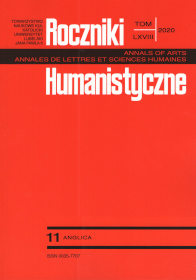Affective Transmission and Haunted Landscape in Jesmyn Ward’s Sing, Unburied, Sing
Abstract
The essay discusses Jesmyn Ward’s novel Sing, Unburied, Sing (2017) through Nicolas Abraham’s and Maria Torok’s concept of “transgenerational phantom” and Teresa Brennan’s theory of the transmission of affect. While the novel focuses on poor blacks in the contemporary American South, and, therefore, on the experience of those marginalized and excluded from official discourse, the narrative seems to transgress racial, social, and generational boundaries to address the human predicament in ways that are both visceral and poetic, disturbing and magical. By employing the trope of haunting to talk about racial oppression, the author combines past and present to demonstrate how slavery and racism continue to take their toll, producing more individual and communal traumas. The essay argues that in Sing, Unburied, Sing Ward not only deconstructs such dominant Western categories as past and present, black and white, male and female, or life and death, but also indicates a way of dealing with and communicating traumatic realities that goes beyond the Symbolic patterns of making sense of the world.
References
Abraham, Nicholas, and Maria Torok. The Shell and the Kernel: Renewals of Psychoanalysis, edited by Nicholas T. Rand, vol. 1, University of Chicago P, 1994.
Atkinson, Meera. “Channeling the Specter and Translating Phantoms: Hauntology and the Spooked Text.” Traumatic Affect, edited by Meera Atkinson and Michael Richardson, Cambridge Scholars Publishing, 2013, pp. 247–70.
Atkinson, Meera. The Poetics of Transgenerational Trauma. Bloomsbury Academic, 2017.
Atkinson, Meera, and Michael Richardson. “Introduction: At the Nexus.” Traumatic Affect, edited by Meera Atkinson and Michael Richardson, Cambridge Scholars Publishing, 2013, pp. 1–19.
Berthin, Christine. Gothic Hauntings: Melancholy Crypts and Textual Ghosts. Palgrave Macmillan, 2010.
Brennan, Teresa. The Transmission of Affect. Cornell UP, 2004.
Brogan, Kathleen. “American Stories of Cultural Haunting: Tales of Heirs and Ethnographers.” College English, vol. 57, no. 2, 1995, pp. 149–65, www.jstor.org/stable/378807. Accessed 1 Dec. 2020.
Chassot, Joanne. Ghosts of the African Diaspora: Re-Visioning History, Memory, and Identity. Dartmouth College P, 2018.
Choi, Sodam. “The Haunted Black South and the Alternative Oceanic Space: Jesmyn Ward’s Sing, Unburied, Sing.” English Language and Literature, vol. 64, no. 3, 2018, pp. 433–51.
Davis, Colin. “Hauntology, Spectres and Phantoms.” French Studies, vol. 59, no. 3, 2005, pp. 373–79.
Derrida, Jacques. Specters of Marx. 1994. Routledge, 2006.
Goddu, Teresa A. Gothic America: Narrative, History, and Nation. Columbia UP, 1997.
Gordon, Avery F. Ghostly Matters: Haunting and the Sociological Imagination. U of Minnesota P, 1997.
Heholt, Ruth. Introduction. Haunted Landscapes: Super-Nature and the Environment, edited by Ruth Heholt and Niamh Downing, Rowman and Littlefield, 2016, pp. 1–20.
Kerner, Aaron. “Gojira’s Bones: The Monster as a Vessel of Affective Energy.” Traumatic Affect, edited by Meera Atkinson and Michael Richardson, Cambridge Scholars Publishing, 2013, pp. 172–92.
Kristeva, Julia. Powers of Horror. An Essay on Abjection, translated by Leon S. Roudiez, Columbia UP, 1982.
Kristeva, Julia. Revolution in Poetic Language, edited by Margaret Waller, Columbia UP, 1984.
Morrison, Toni. Beloved. Alfred A. Knopf, 1998.
Morrison, Toni. “The Site of Memory.” Inventing the Truth: The Art and Craft of Memoir, edited by William Zinsser, Houghton Mifflin, 1995, pp. 83–102.
Moynihan, Sinead. “From Disposability to Recycling: William Faulkner and the New Politics of Rewriting in Jesmyn Ward’s Salvage the Bones.” Studies in the Novel, vol. 47, no. 4, 2015, pp. 550–67.
Parkin-Gounelas, Ruth. “Anachrony and Anatopia: Spectres of Marx, Derrida and Gothic Fiction.” Ghosts: Deconstruction, Psychoanalysis, History, edited by Peter Buse and Andrew Scott, Macmillan Press, 1999, pp. 127–43.
Seigworth, Gregory J., and Melissa Gregg. “An Inventory of Shimmers.” The Affect Theory Reader, edited by Melissa Gregg and Gregory J. Seigworth, Duke UP, 2010, pp. 1–25.
Ward, Jesmyn. “Cracking the Code.” The Fire This Time: A New Generation Speaks about Race, edited by Jesmyn Ward, E-book, Scribner, 2016, pp. 139–49.
Ward, Jesmyn. Introduction. The Fire This Time: A New Generation Speaks about Race, edited by Jesmyn Ward, E-book, Scribner, 2016, pp. 10–24.
Ward, Jesmyn. Sing, Unburied, Sing. Bloomsbury, 2017.
Ward, Jesmyn, and Danille K. Taylor. “Literary Voice of the Dirty South: An Interview with Jesmyn Ward.” CLA Journal, vol. 60, no. 2, “Decolonizing the University: A Battle for the African Mind” (Dec. 2016), pp. 266–68, www.jstor.org/stable/10.2307/26355922. Accessed 1 Dec. 2020.
Copyright (c) 2020 Roczniki Humanistyczne

This work is licensed under a Creative Commons Attribution-NonCommercial-NoDerivatives 4.0 International License.





